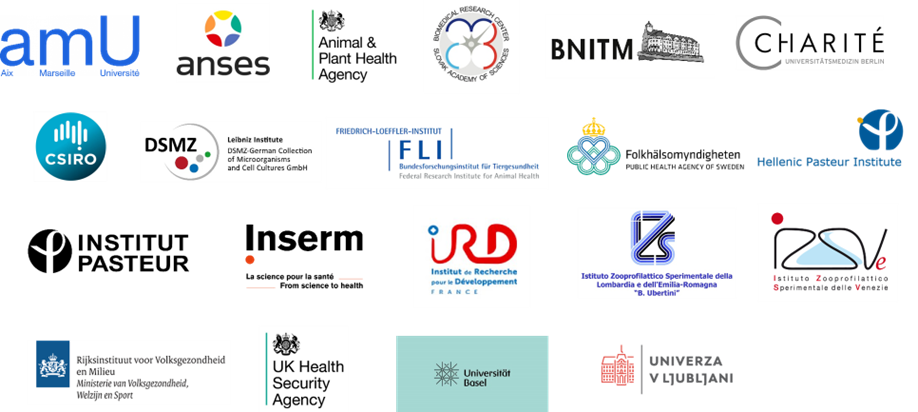EVA-AISBL Press Release
EVA-AISBL
With great pleasure we announce the official registration of the European Virus Archive (EVA) as an AISBL (Association Internationale Sans But Lucratif) under Belgian law. The formal approval of the EVA AISBL legal status by the Royal Decree of Belgium took place on the 27th of March 2025, marking a milestone for EVA. With 14 members on board offering high and diverse scientific expertise in virology, EVA now enters a new era with a strong foundation for stable governance and long-term sustainable research infrastructure to serve Europe’s leadership in virology research and facilitate global pandemic preparedness and response.
EVA-AISBL a unique resource for virology research
EVA-AISBL is the only Research Infrastructure worldwide dedicated to the collection, characterisation, production, and distribution of reference viral resources to support virology research, under the “One Virology” concept, since 2008. While "One Health" addresses the interconnection between human, animal, and environmental health, "One Virology" focuses on studying viruses as key players within these systems, making virology fundamental for addressing "One Health" challenges such as zoonotic diseases, viral biodiversity, and ecosystem health. EVA brings together unique collections, including high-risk and emerging pathogens, and provides researchers from the academic, private, and public health sectors with ethical and equitable access to high-quality viral resources—such as strains, diagnostic tools, and reference materials—in full compliance with international regulations. By supporting fundamental research, innovation in vaccine, antiviral, and diagnostic development, and by distributing reference materials globally, EVA plays a critical role in enhancing preparedness and response to viral outbreaks.
EVA AISBL: A Collective Commitment to Global Virology
This new chapter is built on the collective strength of its founding members—public health agencies, academic institutions, veterinary institutes, and research centers—spanning seven European countries and covering a broad range of expertise in virology.
From France, EVA integrates collections of viruses and derived products held by Aix-Marseille Université (AMU), INSERM, Institut Pasteur and IRD, encompassing a wide spectrum of human viruses, arboviruses, respiratory pathogens and viruses relevant to global health contexts, while the Agence nationale de sécurité sanitaire de l’alimentation, de l’environnement et du travail (ANSES) contributes critical resources in plant virology. Germany contributes a strong focus on plant, veterinary and human virology, with the Friedrich-Loeffler-Institut (FLI) providing a broad collection of animal and zoonotic viruses; DSMZ hosting one of the most comprehensive plant virus collections in the world; Bernhard Nocht Institute for Tropical Medicine (BNITM) and Charité – Universitätsmedizin Berlin offering extensive clinical and research-grade viral isolates, including access to BSL-4 agents. Italy’s IZSLER and IZSVE hold key collections of veterinary and food-borne viruses, supporting animal health surveillance and research on zoonotic threats.
The University of Ljubljana in Slovenia contributes valuable viral resources linked to human health and zoonoses, while Slovakia’s Biomedical Research Center of the Slovak Academy of Sciences (BMC SAS) brings important plant and tick-borne virus collections. From Sweden, the Swedish Public Health Agency (Folkhälsomyndigheten, FOHM) enhances the EVA network with public health-oriented collections and diagnostic materials. The Netherlands' National Institute for Public Health and the Environment (RIVM) offers extensive resources in viral surveillance and public health, including materials related to respiratory and enteric viruses. The Hellenic Pasteur Institute (HPI) in Greece brings specialized collections and research in molecular virology, focusing on viral pathogenesis and diagnostics.
Meanwhile, from the United Kingdom the UK Health Security Agency (UKHSA) provides a wide array of high-consequence pathogens and reagents developed for outbreak response and preparedness, and the Animal and Plant Health Agency (APHA) provides vital expertise and collections in veterinary virology, particularly concerning notifiable diseases affecting livestock and wildlife. Further enriching EVA's global reach, the University of Basel (UNIBAS) in Switzerland contributes through its Department of Biomedicine, focusing on translational virology research and maintaining collections pertinent to clinical virology. Australia's Commonwealth Scientific and Industrial Research Organisation (CSIRO) adds to EVA's diversity through its collection of zoonotic and animal virus materials held at the high-containment Australian Centre for Disease Preparedness (ACDP), supporting both research and biosecurity initiatives.
The acquisition of the AISBL legal status for EVA will enhance services, and secure long-term human and technical capacities for promoting scientific excellence and safeguarding competitiveness and autonomy. By accelerating solutions to emerging viral threats, EVA is and will continue to be a key asset for infectious disease research worldwide and for EU resilience and sovereignty against pandemics, supporting public health and global security, under a common vision: One Virology for One Health

